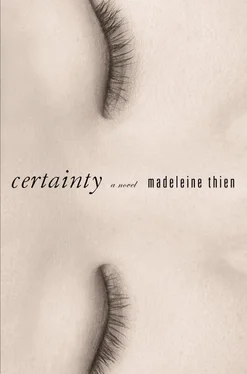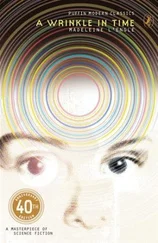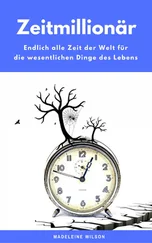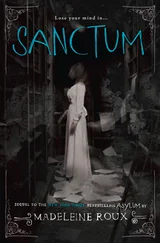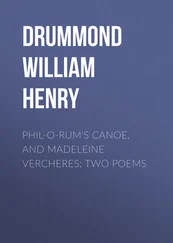Well past midnight, she rose in the dark and dressed quickly, then walked down to the harbour, where she found Lohkman and his brother gathering nets into the boat.
They spoke for a few minutes about the night’s work, then they pushed the boat away from shore, climbing deftly in. Lohkman pulled the cord, the engine stuttered to life, and they slid over the glassy water. From the bay, she could see the town for what it was, a small opening in the jungle, the cloth of the Union Jack moving to and fro above the neat white buildings and the green padang . To her right, stilt houses crowded out from the land, a water village balanced on floating docks. On every side, the green repetition of the trees, the kendilong , closed in on them.
Lohkman came from a family of fishermen. During the war, his family’s boats had been confiscated and they had hidden in the jungle. When the war ended, only Lohkman, his brother, Tajuddin, and Tajuddin’s wife remained, and they had built a small dwelling in the water village.
Lohkman cut the engine and the boat drifted. His brother crouched at the stern of the boat, slowly murmuring a prayer. Tajuddin was in his thirties, and his hair, already white, stirred in the wind. Tajuddin extended his leg over the side, touched his bare foot to the water. “There is but one God,” he said, his voice dissipating on the wind. Still wearing his clothes, he let his body fall overboard.
The sound of the water opening eventually turned into a hush and then silence. Ani watched the hand that still held tight to the gunwale, the rest of the body invisible beneath the surface. Lohkman kept the boat steady. Underneath the water, Tajuddin was listening for the shoals of fish. Each species had a distinctive sound, and if he waited and listened, he could recognize them and follow the sound to where they lay. Years ago, he had taught Lohkman all he knew of fish-craft, about the wind and currents, how to handle the boat and make use of the many types of nets. Lohkman had told Ani that for six months he had studied the art of listening for the fish. At first, he could not distinguish them from the sound of the sea and the waves, but over time the skill had come to him.
They heard his brother before they saw him, a ripple of water, and then his face, silver hair falling across his eyes. He climbed up into the boat, ignoring Lohkman’s outstretched hand, started the engine, and steered the boat west.
At the appointed place, she gathered the jala , a circular net weighted with metal rings. Turning her body, Ani opened her arms and cast the net. It bloomed in the air, unfurling in the shape of a bell, falling smooth and flat. The swaying movements of her arms swept the fish into the folds. Lohkman’s brother had taught her how to throw the casting net when she was only thirteen. She had a talent for it, and a love of the water, and so, even though girls rarely went out with the men, he had given her a place on his boat. Two or three nights each week, depending on the season and the tides, they went out together.
Once, Lohkman had taken her underwater. He had shown her how to release the air from her lungs, a stream of bubbles trailing from their lips, their weight sinking them to the sea floor. Schools of fish brushed their bodies, circling them in a well of colour. Below, weeds unfurled to touch them. When they came up for air, he told her how to listen for the sound of the ikan selar kuning , with its deep-yellow stripe, which made a noise like the wind. He touched the small of her back, bringing her attention to the waving sea life, the colours so bright it sent a slow thrill along the length of her body.
Taking turns now, moving from one side of the boat to the other, they cast their nets out, speaking little. They poured their catch into the hold beneath the floorboards of the boat. Occasionally, Tajuddin would dive again, surfacing to direct the boat to a different location.
In the quiet, she thought of Matthew, of that morning, last month, when she came off the boat at dawn and saw him standing on the shoreline. His bicycle leaned against his hip, his eyes searching the returning boats, the crowd of people, finally coming to rest on her. Later, she learned that when he had asked for news of her, people told him to come here, saying that it would be easy to find her on Tajuddin’s boat, with its red phoenix painted on the hull. She was carrying her take-home bundle of fish and prawns, and she held the bundle in the crook of one arm, awkwardly, surprise holding her still. He had been a child when she last saw him. Changed, she thought, yet utterly familiar. She stood on the sand, the tide running over her feet, and another lifetime flooded her memory.
Later that day, in the evening, they had walked along Leila Road, and then into the rubber plantation that had once been owned by Matthew’s father and now belonged to his uncle. It was why he had returned to Sandakan, Matthew said, to help his uncle manage the plantation. In four months, he would leave for Australia to begin university. The end of the war was still so vivid to them both, the day on which the Australian soldiers arrived, when the Japanese surrendered the town. She remembered that night, on the shore, when Matthew had described to her the burning cigarettes, his father running blindly, then pushed to his knees and shot. His face had seemed to her like a mask then, vacant, frightening to see. She had feared that if she reached out to touch him, he would splinter in her hands. And then, suddenly, he had disappeared from her life. Two days after his father’s murder, Matthew and his mother had fled Sandakan. They had taken the first steamer they could arrange passage on.
She told him about the orphanage, where her life had faded into a kind of stillness, an endless grieving, with all those that she loved disappeared. “There was a story that I told myself,” she said. “In my imagination, you had found a way into Sandakan, the way it once was. When the adults around me spoke of an afterlife, of wandering souls, this was the place I imagined. Not something in the future, but something known from before. A place that I, myself, had once seen.”
Behind them, the sun set, illuminating the ridges of the hills, trailing darkness behind it. The plantation lamps were lit, row by row, and she felt as if she were walking the corridors of an infinite house.
He described Tawau to her, his mother’s extended family, and the stilt house where they lived for three years. Then, the year he turned twelve, his mother had remarried, and the photographs of his father, the letters and writing pens, had been put into boxes and packed away. His mother, he said, needed to go on with her life, to leave the stigma of her first marriage behind. “But sometimes, at night,” Matthew said, “even now, my mother leaves the back door propped open with a stone. After the war, everything was left unfinished. We never found my father’s body and she never had the chance to bury him. He’s gone, of course. She knows this. And yet some part of her still believes he’ll come back again.”
He said that he remembered watching Ani sing the Kimigayo , the way she once traded stolen cigarettes for food. He could describe the sarong that she wore, the long braid of her hair. He remembered her when she had lived through the worst of her solitude.
They had walked between the rows of trees, stopping every now and then to catch their breath, to look up through the high leaves and thereby slow the passing of time. They talked about Mas and Halim, about the fishing boats and the peaceful routine of each day. In Sandakan, she had seen new buildings rise from the ground – the hospital and Magistrate’s Court, the administration offices – all the while unable to forget what had lain there before, the rubble and waste, and even further back, like something imagined, the old town.
Читать дальше
